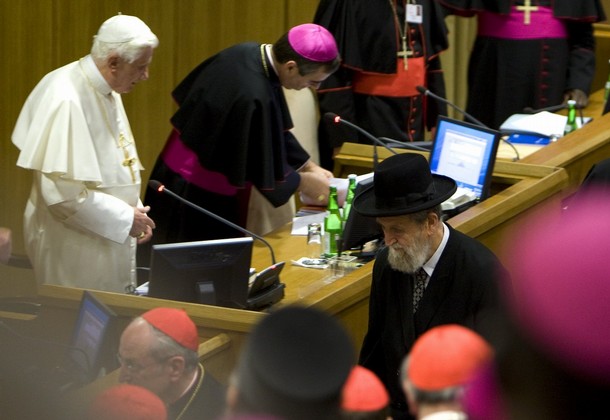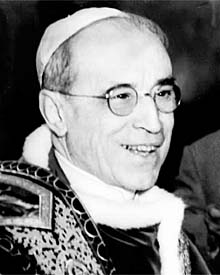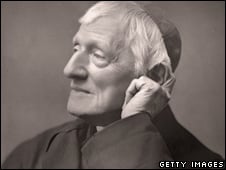 “The first Jew to address a Vatican synod said on Monday that wartime Pope Pius XII should have done more to help Jews during the Holocaust.” That’s the lead on the incisive Reuters story about Rabbi Shear-Yashuv Cohen of Haifa, in Israel, who told Reuters he might have stayed away if he had known the major Church gathering coincided with ceremonies to honor Pius on the 50th anniversary of his death. Rabbi Cohen was addressing the Synod on the Word, a gathering of bishops discussing the role of the bible in Catholic life (no jokes, please). Cohen was going to give some insights into how Jews read Holy Scriptures, but he felt he could not ignore the re-emerging Pius controversy. (Foto via Whispers)
“The first Jew to address a Vatican synod said on Monday that wartime Pope Pius XII should have done more to help Jews during the Holocaust.” That’s the lead on the incisive Reuters story about Rabbi Shear-Yashuv Cohen of Haifa, in Israel, who told Reuters he might have stayed away if he had known the major Church gathering coincided with ceremonies to honor Pius on the 50th anniversary of his death. Rabbi Cohen was addressing the Synod on the Word, a gathering of bishops discussing the role of the bible in Catholic life (no jokes, please). Cohen was going to give some insights into how Jews read Holy Scriptures, but he felt he could not ignore the re-emerging Pius controversy. (Foto via Whispers)
“We feel that the late pope (Pius) should have spoken up much more strongly than he did,” Cohen, 80, said in an interview hours before he was due to address the gathering of Catholic bishops from around the world. Cohen said that in his speech he planned to make an indirect reference to Jewish disappointment about Pius as well as an appeal to all religious leaders to denounce Iranian President Mahmoud Ahmadinejad.
Indeed, as John Allen reports from Rome, that’s what Rabbi Cohen did:
At the end of a brief speech to the synod this afternoon on the Jewish approach to the Bible, Rabbi Shear-Yashuv Cohen alluded to the controversies over Pius XII. “We cannot forget the sad and painful fact of how many, including great religious leaders, didn’t raise a voice in the effort to save our brethren, but chose to keep silent and help secretly,” said Cohen, the Chief Rabbi of Haifa in Israel.
“We cannot forgive and forget, and we hope you understand our pain, our sorrow,” Cohen said, speaking in English to an audience of some 253 cardinals, archbishops and bishops, as well as Benedict XVI. Cohen never mentioned Pius XII by name, though in context the reference seemed obvious.
His remarks on Pope Pius to the synod were not in Cohen’s prepared text, suggesting a last-minute addition.
 As John notes, Cohen’s remarks come as the “Pius Wars” are heating up: Benedict is weighing whether to move forward with Pius’ canonization cause, and the pope strongly defended his wartime predecessor in a speech last month to the interreligious dialogue group, The Pave the Way Foundation:
As John notes, Cohen’s remarks come as the “Pius Wars” are heating up: Benedict is weighing whether to move forward with Pius’ canonization cause, and the pope strongly defended his wartime predecessor in a speech last month to the interreligious dialogue group, The Pave the Way Foundation:
“When one draws close to this noble Pope, free from ideological prejudices, in addition to being struck by his lofty spiritual and human character one is also captivated by the example of his life and the extraordinary richness of his teaching. One can also come to appreciate the human wisdom and pastoral intensity which guided him in his long years of ministry, especially in providing organized assistance to the Jewish people.
“Thanks to the vast quantity of documented material which you have gathered, supported by many authoritative testimonies, your symposium offers to the public forum the possibility of knowing more fully what Pius XII achieved for the Jews persecuted by the Nazi and fascist regimes. One understands, then, that wherever possible he spared no effort in intervening in their favour either directly or through instructions given to other individuals or to institutions of the Catholic Church. In the proceedings of your convention you have also drawn attention to his many interventions, made secretly and silently, precisely because, given the concrete situation of that difficult historical moment, only in this way was it possible to avoid the worst and save the greatest number of Jews. This courageous and paternal dedication was recognized and appreciated during and after the terrible world conflict by Jewish communities and individuals who showed their gratitude for what the Pope had done for them.”
Michael Phayer’s new book, “Pius XII, the Holocaust and the Cold War,” is yet another example of the ongoing search for the historical Pius. But Benedict himself has fed the controversies with his own impolitic moments (like his flat-footed speech at Auschwitz) and actions such as the restoration of Latin prayers for the conversion of the Jews and his fervid outreach to traditionalists who are some of the most fervent anti-Semites in Christianity today. Giving Pius the green light to sainthood would compound the controversy; not doing so would be seen as a rank injustice by some Catholics.
